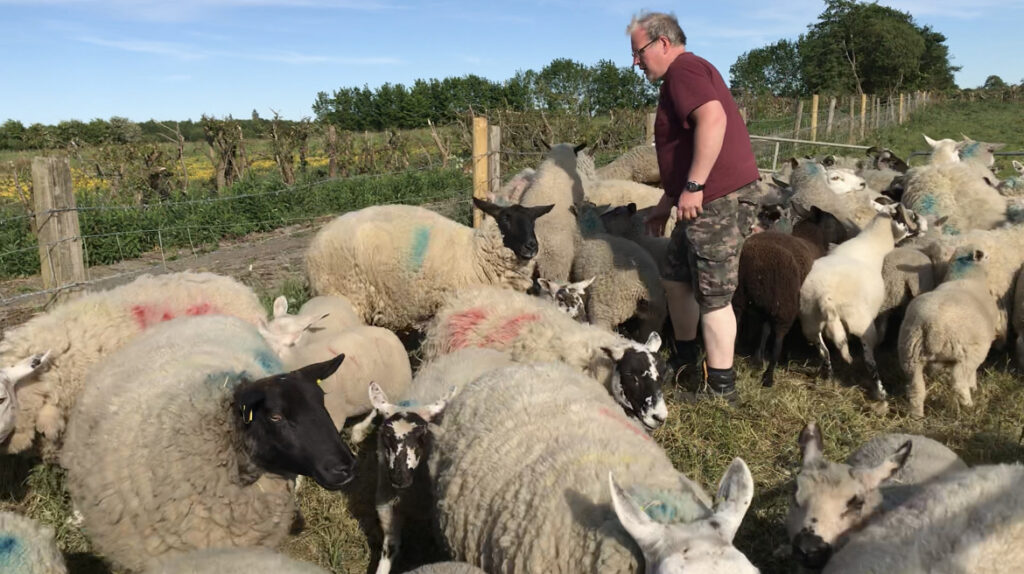Alan and Wendy Dempster breed sheep on their 50ac farm near Ballymoney in Co. Antrim. It is a fourth-generation, family-owned farm where they rear and breed 120 sheep.
The breeds are Suffolk and Texel crosses which they say make a good carcass. They are “hoping to work with Dutch Spotted lamb; it is very trendy at the moment, and we are interested to see what kind of meat they will produce”, Wendy said.
“My husband is a part-time sheep farmer. The sheep were housed for lambing in March, but they have now swapped to lambing outside in April because they think it is healthier. The dream is for him to go full-time.”
Wendy herself is a fairly recent recruit to farming. “My introduction to farming really happened during [the Covid-19] lockdown,” she explained.

“I had lived on the farm for about eight years with my husband and daughter but was really only ever involved at the weekends as I commuted to my accountancy job in Belfast all week.
“During the pandemic I was furloughed and started getting more hands on. It gave me a real appreciation for the work and dedication that goes into producing the high standard of lamb.”
Wendy started her own flock from orphaned lambs during the pandemic lockdown, bottle feeding six times a day to begin with.
“I was determined to learn the process from start to finish. Naively I named them: Snow White; Princess Fiona; Darcy; Missy; Harriett… you get the idea. These are some of the mothers to the Farm Quality Assured, grass-fed lambs which we now rear.
“The first lamb being born into my flock was extremely special to me and I love having the opportunity to be innovative in a hugely male dominated sector.
“It is small milestones that make my job in agri worth it. E.g., when I had an aged farmer from down the road tell me he had heard about my concoction for bloated lambs and could I make him up some?”

Diversifying from the sheep enterprise
Prices at the mart or the factory rarely pass £5.00/kg, with the average being £4.50/kg, so Alan and Wendy decided to diversify.
“After having the costs involved highlighted, we realised we needed to increase the value of our lambs to make sheep farming viable and the way to do so was to showcase the great quality of the product in a way to appeal to a larger market,” Wendy continued.
“We wanted to add value to our meat. I was interested in looking at different remedies. I love a wee bit of charcuterie and cheeseboard and that’s where the idea for lamb ham came from. There was nothing out there.
“I was on everything you could read or watch on how to cure lamb. It took a few months and a few mistakes but three months, takes about two weeks to cure. I use wet rather than dry cure because it’s quicker.”
She says some of her market research involved making dinner.
“I held a few shepherdess suppers and got people to try it and the feedback was great. They were the first people ever to get to taste it. We had review cards and all but one said the lamb ham was the highlight of the evening for them,” Wendy said.

They converted a horsebox into a mobile kitchen and worked with the College of Agriculture, Food and Rural Enterprise (CAFRE) in Cookstown, Co.Tyrone to develop recipes. Since then, their business plan has evolved.
“The initial plan was to take our lamb to events and sell from our upcycled horsebox called the ‘Lamb Van’ at farmers’ markets and events. but we have since organically expanded into retail.
Lamb ham
So, is lamb a hard sell?
“It is seen as a special occasion meat, so the challenge was to get people to see its health benefits. People have this mistaken idea that lamb meat is very fatty, but it is actually a good type of fat,” Wendy explained.
She said that making and selling hand-held snacks is working for them.
“We hook them in with our lamb sausage rolls and burgers and then they come back for more,” she added.
“On the second day at an event, a young boy came to buy a lamb burger with the money his dad had gave him because he had loved the one he got the day before. That melted my heart. I sent him home with a few for his freezer.
“A few weeks later at an agricultural show he came back with his dad and brothers so they all could have burgers. Things like that make all the hard work worth it.

“Adding extra value to our lambs will hopefully make it possible for Alan to farm full-time. This is a driving factor for us,” Wendy said.
“I served my time as an electrician,” Alan added. “I always kept a few sheep. I knew from an early age where my passion lay. Sheep farming was in my blood.
“It is extremely hard to make sheep farming viable, especially with the ever-increasing costs involved.
“By increasing the value of the end product from the farm, I hope to make the transition to full-time. Time will tell,” Alan concluded.

